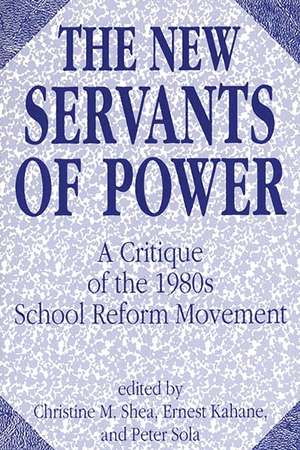The New Servants of Power: A Critique of the 1980s School Reform Movement
Editat de Christine M. Shea, Peter Sola, Ernest Kahaneen Limba Engleză Paperback – 9 apr 1990 – vârsta până la 17 ani
| Toate formatele și edițiile | Preț | Express |
|---|---|---|
| Paperback (1) | 178.54 lei 43-57 zile | |
| Bloomsbury Publishing – 9 apr 1990 | 178.54 lei 43-57 zile | |
| Hardback (1) | 437.15 lei 43-57 zile | |
| Greenwood Press – 31 dec 1988 | 437.15 lei 43-57 zile |
Preț: 178.54 lei
Preț vechi: 257.82 lei
-31% Nou
Puncte Express: 268
Preț estimativ în valută:
34.17€ • 35.45$ • 28.56£
34.17€ • 35.45$ • 28.56£
Carte tipărită la comandă
Livrare economică 17-31 martie
Preluare comenzi: 021 569.72.76
Specificații
ISBN-13: 9780275936020
ISBN-10: 0275936023
Pagini: 216
Dimensiuni: 156 x 235 x 16 mm
Greutate: 0.33 kg
Ediția:Revised
Editura: Bloomsbury Publishing
Colecția Praeger
Locul publicării:New York, United States
ISBN-10: 0275936023
Pagini: 216
Dimensiuni: 156 x 235 x 16 mm
Greutate: 0.33 kg
Ediția:Revised
Editura: Bloomsbury Publishing
Colecția Praeger
Locul publicării:New York, United States
Notă biografică
CHRISTINE SHEA is currently a center fellow at the North Carolina Center for the Advancement of Teaching. Her research area is the history of twentieth-century school and social reform movements. She is currently completing work on a social history of the Progressive-era mental hygiene movement.PETER SOLA is Associate Professor of Foundations of Education at Howard University, Washington, D.C.ERNEST KAHANE is presently a training consultant for a number of leading computer and high tech firms along the Boston beltway. Dr. Kahane is also an Adjunct Professor at Boston University.
Cuprins
Foreword by Maxine GreenePrefaceAn Introductory Overview of the 1980s School Reform DebatePentagon vs. Multinational Capitalism: The Political Economy of the 1980s School Reform Movement by Christine M. SheaA Critique of the Concept of Work in the School Reform LiteratureA Critique of the Concept of Work and Education in the School Reform Reports by Don T. MartinThe State's Stake in Educational Reform by Edward H. BermanWhere Computers Are Taking Us in the Educational Field by Ernest Kahane and Andrew D. OramThe Corporate Community on the Ideal Business-School Alliance: An Historical and Ethical Critique by Peter SolaEducational Reform and "The New Equity"The Bootstrap Ideology of Educational Reform: What the Recent Reports Say about the Current and Future Status of Blacks in Higher Education? by Beverly M. GordonMore of the Same: Reforms of American Public Schooling and the Minority Language Student by Timothy G. ReaganThe Eighties Image of Girls and Women in the Educational Reform Literature: A Review of the Issues by Kathryn M. Borman and Patricia O'ReillyThe New Equity: Competing Visions by William T. PinkSchool Reform Proposals for "The New Curriculum"Civic Education Reform and the Quest for a Unified Society: A Critique of R. Freeman Butts's Agenda for Civic Learning by Stuart A. McAninchAn Evaluation of the Aims and Curriculum Proposals in Sizer's Horace's Compromise by John Martin Rich and Joseph L. DeVitisIs Continuing Education Anything More than a Yuppie Phenomenon? by Paul C. ViolasTeachers, Their World, and Their Work: A Review of the Idea of "Professional Excellence" in School Reform Reports by Richard J. AltenbaughBibliographyIndex
Descriere
Descriere de la o altă ediție sau format:
This is an important book because its focus is critical, and its aim is to demystify the prevailing ideology of school reform. Perhaps never has the argument been greater than now for democracy and the restoration of human subjectivity and agency, two very important aspects of this collection of critical essays. The introductory essay is excellent in its elucidation of the world political economy of the 1980s and current educational reforms. It sets a clear direction for the remainder of the book, which is noteworthy for its organiational, conceptual, and written clarity. Topics include education reform and work, teacher education, continuing education, and equity. In its attempt to present alternative ways of seeing and interpreting educational/social phenomenon, this book is one of the best to appear. The text is refreshingly free of a lot of jargon; thus the reader is better able to understand the complexities of educational and social critique. Highly recommended for upper-level undergraduate and graduate reading as well as academic library acquisition. Choice
This is the first comprehensive scholarly critique of the recent literature on school reform. The essays critically analyze the three major issues that have been the focal point of reform efforts: the restructuring of teacher education programs, the reconceptualization of the social function of American high schools and colleges, and the redefinition of the educated individual. The New Servants of Power brings together the work of an emerging group of revisionist scholars in this field, enlarging the scope of contemporary debate about school and educational reform. The essays critically assess national educational reports, books, and related policy statements that set the parameters from which much of the contemporary education debate proceeds.
The work considers the contemporary school reform debate as a reflection of a conflict between dominant economic interest groups about the most efficient means of rebuilding labor productivity and American economic power. Next, the concept of work and the schools as reflected in school reform literature is addressed. A section about how groups and individuals who are traditionally less well-served fare under school reform follows. Included are specific implications for constituents, critical questions about continued inequitable distribution of resources, and recommended alternative policies. Finally, the treatment of aims, attitudes, skills, and disciplines embodied in specific curriculum proposals is analyzed. The New Servants of Power is an excellent resource for educators and students on courses such as current issues in education, school and society, and sociology of education.
This is an important book because its focus is critical, and its aim is to demystify the prevailing ideology of school reform. Perhaps never has the argument been greater than now for democracy and the restoration of human subjectivity and agency, two very important aspects of this collection of critical essays. The introductory essay is excellent in its elucidation of the world political economy of the 1980s and current educational reforms. It sets a clear direction for the remainder of the book, which is noteworthy for its organiational, conceptual, and written clarity. Topics include education reform and work, teacher education, continuing education, and equity. In its attempt to present alternative ways of seeing and interpreting educational/social phenomenon, this book is one of the best to appear. The text is refreshingly free of a lot of jargon; thus the reader is better able to understand the complexities of educational and social critique. Highly recommended for upper-level undergraduate and graduate reading as well as academic library acquisition. Choice
This is the first comprehensive scholarly critique of the recent literature on school reform. The essays critically analyze the three major issues that have been the focal point of reform efforts: the restructuring of teacher education programs, the reconceptualization of the social function of American high schools and colleges, and the redefinition of the educated individual. The New Servants of Power brings together the work of an emerging group of revisionist scholars in this field, enlarging the scope of contemporary debate about school and educational reform. The essays critically assess national educational reports, books, and related policy statements that set the parameters from which much of the contemporary education debate proceeds.
The work considers the contemporary school reform debate as a reflection of a conflict between dominant economic interest groups about the most efficient means of rebuilding labor productivity and American economic power. Next, the concept of work and the schools as reflected in school reform literature is addressed. A section about how groups and individuals who are traditionally less well-served fare under school reform follows. Included are specific implications for constituents, critical questions about continued inequitable distribution of resources, and recommended alternative policies. Finally, the treatment of aims, attitudes, skills, and disciplines embodied in specific curriculum proposals is analyzed. The New Servants of Power is an excellent resource for educators and students on courses such as current issues in education, school and society, and sociology of education.











